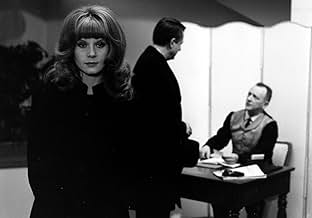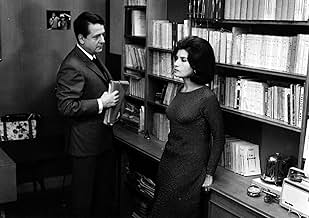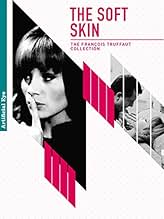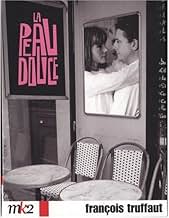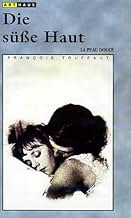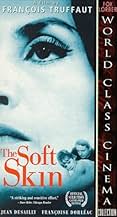IMDb RATING
7.5/10
8.9K
YOUR RATING
A well-known publisher and lecturer starts an affair with an air hostess.A well-known publisher and lecturer starts an affair with an air hostess.A well-known publisher and lecturer starts an affair with an air hostess.
- Director
- Writers
- Stars
- Awards
- 1 win & 2 nominations total
Françoise Dorléac
- Nicole
- (as Françoise Dorleac)
Carnero
- Lisbon organizer
- (uncredited)
Georges de Givray
- Le père de Nicole
- (uncredited)
Catherine-Isabelle Duport
- Jeune fille Reims
- (uncredited)
Maximiliènne Harlaut
- Mme. Leloix
- (uncredited)
Charles Lavialle
- Veilleur hôtel Michelet
- (uncredited)
- Director
- Writers
- All cast & crew
- Production, box office & more at IMDbPro
Featured reviews
Very poetic, early Truffaut, but already at his best. This story of a middle-aged intellectual man who certainly should not have too much to complain about in his life, but wants to give it a try for whatever reasons (mid-life crisis? vanity? play instinct? the beginnings of some sort of amour fou on his part?), thus bringing about a catastrophe, is brought to the screen in a powerful and masterly way.
It's all been described in large part by other users so far: Raoul Coutard's impressive black-and-white cinematography, the acting by Dorléac, Desailly and Benedetti, it all fitted very well.
What's more to mention, however, is a beautiful soundtrack by Georges Delerue, in my opinion a true masterpiece of film scoring, with a haunting main theme.
This is really a film I shall keep in my heart for a long time. I certainly prefer it to "Jules et Jim".
It's all been described in large part by other users so far: Raoul Coutard's impressive black-and-white cinematography, the acting by Dorléac, Desailly and Benedetti, it all fitted very well.
What's more to mention, however, is a beautiful soundtrack by Georges Delerue, in my opinion a true masterpiece of film scoring, with a haunting main theme.
This is really a film I shall keep in my heart for a long time. I certainly prefer it to "Jules et Jim".
Truffaut's study of a middle-aged man losing his way in life in the age-old fashion is caught in a mesmerizing series of quick-succession shots and sympathetically-captured quotidian details. An unthinking, self-assured man; his wounded, passionate wife; his sweet, vulnerable lover; an inevitable tragedy. This underrated film has no real surprises, but its sure-footedness is impressive and the simple story ultimately very moving.
Truffaut filmed La Peau Douce immediately after the international success of "Jules et Jim". Released at the heyday of the nouvelle vague, critics and audiences panned the film as a futile resort to bourgeois classicism after the unconventional antics of his previous masterwork.
They could not have been more mistaken. Time has treated La Peau Douce better than most of his later efforts. It is definitely a triumph of direction with each scene being carefully planned and meticulously structured, not unlike a Hitchcock movie. In practice, Truffaut transposes Hitchcock's mechanisms of suspense into a seemingly trivial story concerning the illicit love affair of a distinguished editor/author with a younger stewardess and its withering consequences. The characters and the milieu of the story are effortless evoked, but the main joy is derived from the visual inventiveness that Truffaut shows in scene after scene. It's a triumph of a purely cinematic mode of expression, which Truffaut was one of the few who had really mastered it.
They could not have been more mistaken. Time has treated La Peau Douce better than most of his later efforts. It is definitely a triumph of direction with each scene being carefully planned and meticulously structured, not unlike a Hitchcock movie. In practice, Truffaut transposes Hitchcock's mechanisms of suspense into a seemingly trivial story concerning the illicit love affair of a distinguished editor/author with a younger stewardess and its withering consequences. The characters and the milieu of the story are effortless evoked, but the main joy is derived from the visual inventiveness that Truffaut shows in scene after scene. It's a triumph of a purely cinematic mode of expression, which Truffaut was one of the few who had really mastered it.
François Truffaut's fourth feature and his first true masterpiece is essentially a classic love triangle, filmed like a quiet juggernaut that eventually overwhelms all those involved. On a quick trip to Lisbon for a lecture, literary essayist Jean Desailly's eye catches the lovely Françoise Dorléac, the air hostess on his flight. Soon he's asking her out for a drink and a love affair develops in between her flights, as his married life with seductive but demanding wife Nelly Benedetti slowly unravels. Much to Truffaut's credit, there is no judgment passed on any of the characters: whether Desailly is undergoing a dreaded mid-life crisis and wishes to be young again or is merely indulging an intellectual whim, whether he really wants to prove himself he is still a man capable of passion or just looking for a way out of his stifling marriage, is entirely up to the viewer to decide. But the director doesn't avert his eye from the seedy unpleasantness of the central situation, as the masterfully extended Reims interlude and the shock ending prove. Basically, it's a film about the mess people make when they think they're in love, all the more disturbing because Truffaut bases it all on chance meetings and missed opportunities - had Desailly not arrived late for his plane to Lisbon, had Dorléac not called him back at the hotel, maybe none of this would have happened. Marvelously shot in black and white by Nouvelle Vague lenser Raoul Coutard, this was the very first film where Truffaut showed the world all he was capable of; it's a stunningly modern film on the most classic of all melodramatic stories.
10andrabem
Pierre Lachenay (Jean Desailly) is a successful writer. He is leaving Paris for Lisbon to give a conference on "Balzac et l'argent". On the flight to Lisbon he feels instant attraction for a beautiful flight stewardess. In Lisbon he'll discover that he's staying at the same hotel as her. Pierre wastes no time and gets to know her. Her name is Nicole (Françoise Dorléac). She is spontaneous and easy-going, but it's easy to detect the romantic streak in her. They start an affair right there in Lisbon. She gives him her Paris telephone number. He calls her. They meet. In Paris their relationship grows in intensity.
Pierre is a married man. His wife is also a good-looking woman and he has a 10-year-old daughter that loves him (as does his wife). Pierre is an intellectual with an organized life, maybe having had some flings here and there, but nothing that really threatened the comfortable foundations of his life. But now he has met Nicole. And Nicole represents everything that Pierre had never really experienced before: she has a real "joie de vivre" but underneath it, there is pain, and above all, strength - the strength to overcome sadness and start all over again, that is, to live right here and now.
Pierre, on the other hand, as an intellectual, lives a life of compromises. His wife, Franca (Nelly Benedetti), loves him and has a strong personality. She knows exactly what she wants and is determined to fight for it. Pierre is between two strong women. He loves Nicole - she has opened a new life, a new world for him. Will he follow his heart? And where will his heart lead him? I think that "La Peau Douce" is one of the more personal films made by Truffaut. It has a psychological subtlety not displayed in his later works (be it his later Antoine Doinel films, his literary adaptations, or his homages - to Hitchcock, Jean Renoir etc..). Never again would Truffaut reach the depth of "La Peau Douce".
"La Peau Douce" reveals understanding (and tenderness) for all the characters, but alongside these traits there's also a bitter irony and even some touches of dark comedy. The characters are shown in all their weaknesses and beauty. In later Truffaut films the tenderness would be the prevailing feature - the irony would come along in a watered-down form.
Pierre is a married man. His wife is also a good-looking woman and he has a 10-year-old daughter that loves him (as does his wife). Pierre is an intellectual with an organized life, maybe having had some flings here and there, but nothing that really threatened the comfortable foundations of his life. But now he has met Nicole. And Nicole represents everything that Pierre had never really experienced before: she has a real "joie de vivre" but underneath it, there is pain, and above all, strength - the strength to overcome sadness and start all over again, that is, to live right here and now.
Pierre, on the other hand, as an intellectual, lives a life of compromises. His wife, Franca (Nelly Benedetti), loves him and has a strong personality. She knows exactly what she wants and is determined to fight for it. Pierre is between two strong women. He loves Nicole - she has opened a new life, a new world for him. Will he follow his heart? And where will his heart lead him? I think that "La Peau Douce" is one of the more personal films made by Truffaut. It has a psychological subtlety not displayed in his later works (be it his later Antoine Doinel films, his literary adaptations, or his homages - to Hitchcock, Jean Renoir etc..). Never again would Truffaut reach the depth of "La Peau Douce".
"La Peau Douce" reveals understanding (and tenderness) for all the characters, but alongside these traits there's also a bitter irony and even some touches of dark comedy. The characters are shown in all their weaknesses and beauty. In later Truffaut films the tenderness would be the prevailing feature - the irony would come along in a watered-down form.
Did you know
- TriviaThe scenes set in Pierre Lachenay's apartment were filmed in Truffaut's own home.
- GoofsPierre and Nicole are in a hotel elevator approaching the 8th floor, Pierre is on the right side. The following shot from outside the elevator shows Pierre on the opposite side.
- Quotes
Pierre Lachenay: I've learned that men's unhappiness arises from the inability to stay quietly in their own room.
- ConnectionsFeatured in François Truffaut: Portraits volés (1993)
- SoundtracksPierre Et Nicole
Written and Performed by Georges Delerue Et Son Orchestre
- How long is The Soft Skin?Powered by Alexa
Details
Box office
- Gross US & Canada
- $509
- Opening weekend US & Canada
- $11,206
- Apr 25, 1999
- Gross worldwide
- $35,501
- Runtime1 hour 53 minutes
- Color
- Sound mix
- Aspect ratio
- 1.66 : 1
Contribute to this page
Suggest an edit or add missing content

![Watch Bande-annonce [OV]](https://m.media-amazon.com/images/M/MV5BYzY4NmVmYjItNzQ2MS00MDU4LThlODctYjliMTRhM2ZmY2MwXkEyXkFqcGdeQXRyYW5zY29kZS13b3JrZmxvdw@@._V1_QL75_UX500_CR0)
